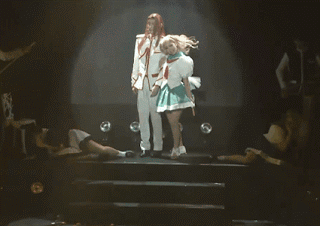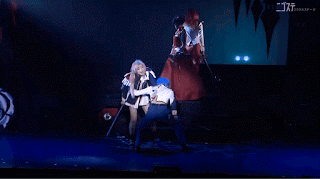Everything You Need to Know About the Utena Musical: Bud of the White Rose
by Giovanna & Yasha of "Empty Movement",When we initially went to see Revolutionary Girl Utena: Bud of the White Rose, the new musical that played in Japan for ten days, it was sort of an afterthought. We were going to Japan for the Utena Exhibition that was happening in Osaka, and it just so happened that the musical was slightly before it, so after a few snide remarks, we decided we would also go see this performance.
Honestly, we expected it to be bad. Have you seen the 1997 musical? It's bad. It's real bad. We love it anyway, but it's the kind of love you have for a broken old misshapen teddy bear — you know it looks stupid and old, it's sort of falling apart, but dammit, it's your bear. So when we stood outside the theater, waiting in line for our seats, we expected to love it and sort of despise it at the same time.
It was good. It was better than good, actually.
It was amazing.

When Nanami yelled at the audience to clap harder, I knew it was the best version of Utena's first arc I'd ever seen. I can't emphasize how well this production captured the essence of RGU; they had everything down, even to the postures and inflections. Juri was the elegant panther we knew so well, her voice a growling purr that broke when she clutched at her chest where her locket would be. Miki was the naive young duelist conflicted about his sister and his struggle to be with or possess Anthy. Saionji stole the show whenever he appeared, with his over-the-top angst countering Touga's languid manipulations. As for Nanami, I'm still not convinced that she didn't just manifest into reality to play herself. Utena's bravery and confusion and determination made me love her more than ever. Wakaba was the true hero of the show, her friendship spurring Utena on to take herself back after Touga's victory. And Anthy was captivatingly cold, wearing a smiling mask of humanity and keeping her distance from the world until the moment Utena finally broke through to her.
The story covers the first arc of Revolutionary Girl Utena, from Utena's first meeting with her Prince to the duel to take back Anthy, and herself, from Touga's grasp. There's very minimal staging, and all the action happens within the spinning roses frame we all know and love. Instead of props, there are shadows projected on the screen at the back, taking the place of a real piano or a visible inverted castle. The Shadow Play Girls as well as Young Touga and Young Saionji use cloth flags to signify Dios manifesting in Utena or to illustrate movement in their surroundings, such as when Touga breaks the wall surrounding the dueling arena. These four also become crowds or other students when necessary, and most importantly, the Shadow Play Girls re-enact the memory of Kozue and Shiori in Miki and Juri's minds, and Young Touga and Young Saionji get to re-enact the scene where they find the girl in the coffin.

The storyline is compressed, of course. We don't get Nanami's animal escapades or the curry body-switching story. What we do get is the most focused form of the story -- Utena stumbles into possession of the Rose Bride, duels to protect her, eventually loses to Touga, and enters one final duel to take Anthy back. However, Nanami does get the spotlight when she interrupts the story for a song about how awesome she is, playing air guitar along with shadow band members. Aside from that, the narrative is very tight, and Miki and Juri's duels are compressed into one beautifully staged dance where Utena defeats both of them, with the lights alternating between blue and orange depending on which duel she's in at the moment. Each duels is beautifully interpreted; Utena's flying leaps are replaced with high kicks, the sound effects are timed to make the clashing swords feel real, and Utena looks genuinely injured when someone scores a hit. Interspersed with all of this are captivating moments where Shiori dances across the stage only to be wrenched apart from her boyfriend by Juri, and Kozue plays the piano as Anthy distracts Miki from his goal.

There's a lot going on at all times, but the musical never feels overwhelming or rushed. No matter where you look on the stage, there's always something happening. While Utena sings about remembering the scent of roses, Saionji looms menacingly over Anthy in the background, and the Shadow Play Girls dance with Young Touga and Young Saionji in the foreground. While not stellar, the singing is more than passable for a production this small, with a couple of standout voices from Wakaba and Anthy. With the amount of intense emoting most of the actors have to do, it's hard to believe that they put on this performance Twice a Day. The casting is perfect at all times; there's never a moment where you don't believe that's really Touga standing there with his knife-sharp cheekbones and his perfect hair, watching the rest of the cast dance around him, literally at his whims.

The musical element takes a few moments to get used to. If you're expecting J. A. Seazar -- don't. The only song of his that's used is "Zettai Unmei Mokushiroku". The numbers we do get are very catchy and at times beautiful; the major theme song, "Absolute Darkness - The Rose Garden", was stuck in my head for days after hearing it. Whenever Anthy sings, it's a treat for the ears, and Wakaba's songs are so convincingly emotional that at one point I had tears in my eyes — and so did the actor playing Utena.
The best news of all is that even though it isn't running in Japan anymore, you can own this musical for yourself! Revolutionary Girl Utena: Bud of the White Rose is on sale on amazon.jp and the English version of Animate. We have full details on the Empty Movement tumblr. It's absolutely worth owning, and —just maybe— there might be a sequel. If there is, I'm going to Japan again to see it. It's just that good.
this article has been modified since it was originally posted; see change history